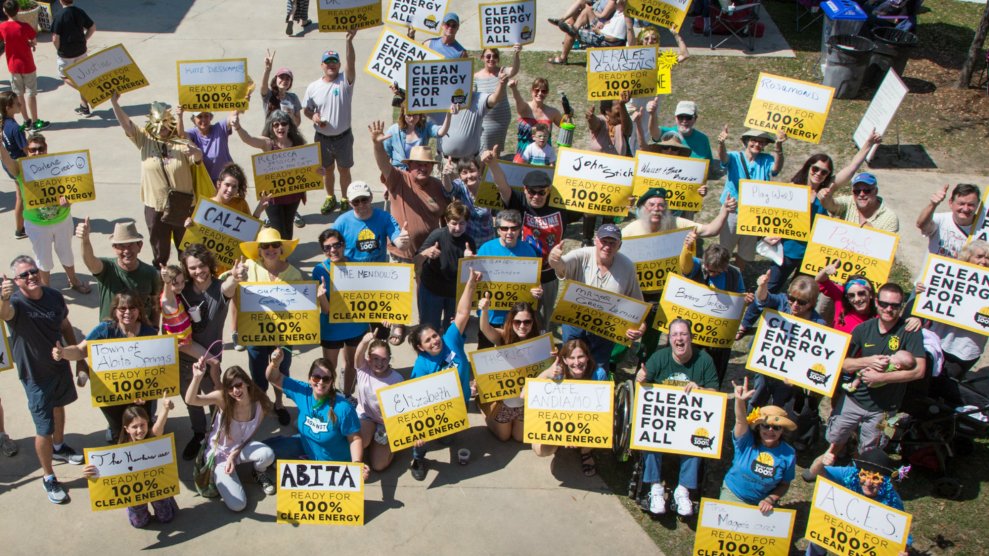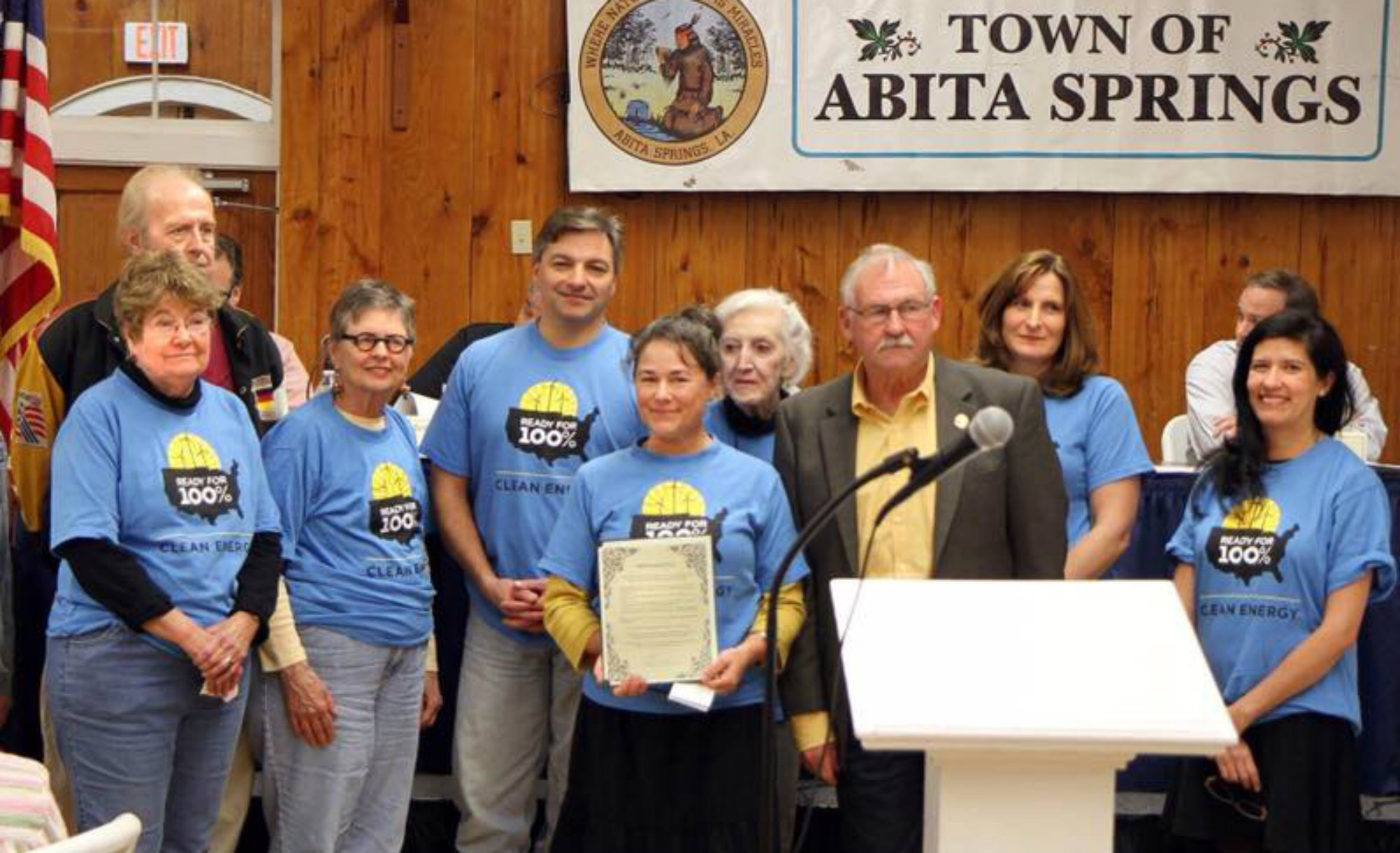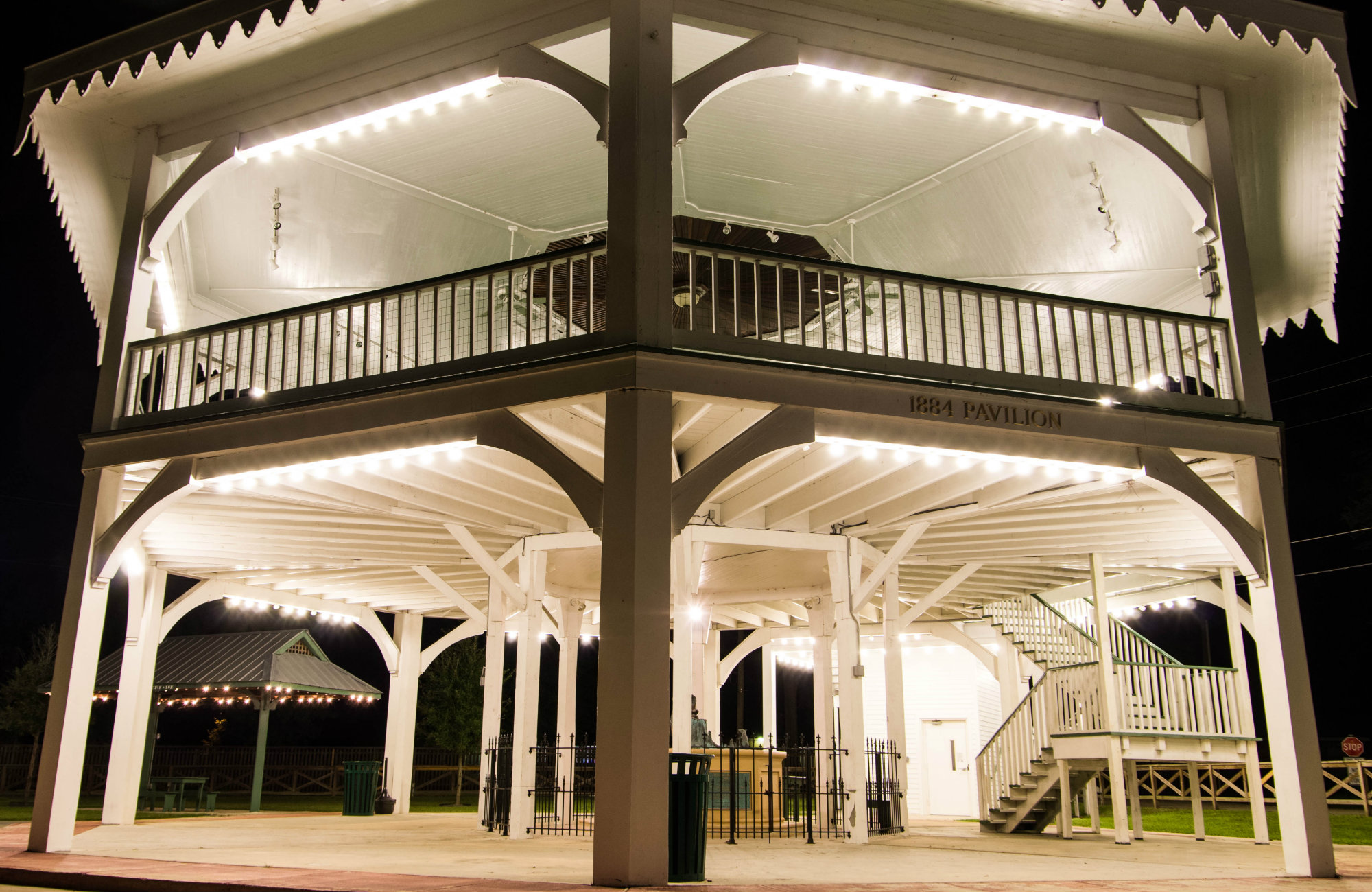
Abita Springs residents celebrate the commitment to 100% clean energy at Abita Springs Earth Fest 2017.George Long Photography
Last year, Mayor Greg Lemons counted every single street light in Abita Springs, Louisiana, and found there were 256. If his town of about 2,900 residents switched over to solar-powered lamps and LED bulbs, he reasoned, taxpayers could save thousands of dollars and be environmentally conscious.
Street lights are just a part of Lemon’s ambitious plans to make Abita Springs a model of energy efficiency and sustainability. A life-long Republican, he has fought fracking, educated himself on renewable energy, and in March 2017, brought Abita Springs into the Sierra Club’s Ready for 100 campaign. The campaign involves sixty-nine communities from all over the country—as large as San Diego and some even smaller than Abita Springs—that have pledged to run entirely on renewable energy by 2050. Abita Springs plans to have every municipal building, every business, and every home powered by renewables in just 12 years. “If this small town in an a oil-rich, oil-friendly state can do this,” Lemons says. “Anybody can do it.”

Lemons presents a proclamation expressing support of the Abita Committee for Energy Sustainability.
Abita Springs Ready for 100
As the Trump administration turns away from renewable energy and loosens the reins on fossil fuel companies, Lemons and mayors across the country are among those taking matters into their own hands and leading the fight for clean energy in their communities. Six of the towns and cities in the campaign are already powered by wind, solar, and other renewable energy sources. Many places on the Ready for 100 list are liberal strongholds—Bernie Sanders’ hometown of Burlington, Vermont, was one of the first cities to reach its goal.
But Abita Springs is one of several led by conservative Republican mayors. “The campaign crosses boundaries,” Kassie Rohrbach, Ready for 100 deputy director, says. “It’s not urban, or rural, or Democrat or Republican.” Lemons agrees. “What I’m doing is part of a wave that has to occur across the country,” he says. (His daughter jokingly calls him a RINO; Republican In Name Only.)
The Sierra Club provides the cities with a “network of practice” to swap insight and holds an annual meeting where they can discuss how to tackle barriers to renewable energy. Lemons says the Sierra Club also provided the framework for Abita Spring’s pledge, and advertising to help share their commitment and strategy with the rest of the country.
But when it comes to finding the funds and feasible ways to run Abita on renewables in just over a decade, Lemons and the Abita Committee for Energy Sustainability are the ones charting the course. “We knew upfront it was going to be a challenge,” Lemons says. “It’s tough for a small town that doesn’t have very much money. That’s how we do things. We set the bar high.”
Lemons was born 70 years ago in the kitchen of his grandmother’s house in Abita Springs, a town named for a Native American woman who, legend says, was healed by water from the aquifer that runs beneath it. Located about an hour north of New Orleans, it is now a tourist destination known for its microbrewery, artists, music, and events like the annual Push Mow parade. Abita Springs is part of St. Tammany parish, a consistently Republican county where 73 percent of voters supported Donald Trump in the 2016 presidential election, and every elected local official is Republican. In 2013, about 7 percent of residents were employed directly by oil and gas, and the industry accounted for about 25 percent of the county’s total payroll, or $900 million, in 2012.

The Abita Brewing Co., which has one of the largest solar arrays in the state. Lemons hopes other local companies follow its example.
Abita Springs
Lemons left town when he was in his twenties to fight in the Vietnam War and then worked for three decades at a banking equipment and security company. When he retired in 2004, he came back home. He was elected to finish a two-year term as mayor in 2012 and was reelected for another four years in 2014. “We have had a lot of changes over time,” Lemons says. “But we still aim to be a small town at heart. A lot of people call us Mayberry.”
Two years after Lemons became mayor, the company Helis Oil & Gas announced plans to drill an exploratory fracking well across from Lakeshore High School, which serves students from Abita Springs. Lemons paid for his own research trips to Texas and Pennsylvania so that he could see the impact of fracking on surrounding communities, and he held community forums about the issue. “At that time we became acutely aware of the environment,” he says. “The clean air we see here, the clean water.”
If fracking were permitted, he realized, both could be jeopardized. Lemons challenged the drilling plans in court. Not all of the Republican members of the town’s council agreed. “They really didn’t like the idea of me going out and filing the lawsuit,” Lemons says. “Two aldermen didn’t vote for the resolution. One of them said fracking is good and brings in money.” Even though the town ultimately lost the legal battle, after drilling an exploratory well, the company abandoned the project.
For Lemons, this fight began his education in renewable energy, electric cars, and energy efficiency. His anti-fracking efforts also caught the attention of the Sierra Club in 2016 as they planned their campaign to help communities transition to renewable energy. Lemons has not always agreed with the Sierra Club, especially when he received a call urging him to vote for Hillary Clinton in the 2016 presidential election. But the opportunity to invest in his town’s future and set a national example with the Ready for 100 campaign made sense to him. He realized that with all the sun baking his town, solar power would be a good business decision.
First, he had to convince the town’s council. “We were told that the council would not be receptive to any kind of conversation, that they were not environmentally-minded and they didn’t want change,” says LeAnn Magee, a Portland, Oregon native who moved to Abita Springs about 5 years ago, who Lemons named chair of the Abita Committee for Energy Sustainability. But after rounds of presentations and a few compromises, the five Republican aldermen voted unanimously for Abita Springs to join the campaign. The official resolution didn’t ask the town to supply any money whatsoever, Magee says. Magee also helped coordinate outreach for a campaign to protect wetlands and protected endangered species from fracking operations. “It’s like pulling teeth to try to change anything around here,” she adds.
Magee and Lemons have had to be creative to find the funding they need. Lemons received a $1,000 grant by joining the Sierra Club’s Mayors for 100 Percent Clean Energy. He started insulating Abita Spring’s buildings, putting up LED lights where he could, and replacing high current, high-voltage appliances. The town is also in the process of building 188 solar panels on the town hall, which will produce 60 percent of the building’s electricity during peak hours and net about $200 a month in savings. (He even added solar panels to his own antique motorboat.)

The Abita Springs Pavilion lit up with the LED lights that Lemons installed.
Abita Springs
Lemons estimates about ten percent of the town currently runs on renewable energy. He doesn’t know if Abita Springs will meet its ambitious goals by 2030, largely because of the dominance of the two fossil fuel-based utility companies that supply its electricity. “To make it happen, we have to have these utility companies buy in,” he says. “We are just the customers.”
In markets where wind and solar have become competitive, many utility companies are now offering their customers renewable energy options. The Sierra Club’s Rohrbach says the five cities that have successfully made the transition to 100 percent renewable energy “have a lot more agency and direct control” over their utility companies, either because the municipality owns them, or the city has a seat on the board of directors. But for those that don’t, “it’s even more important that the city stand up and declare it’s values and vision,” she says.
As soon as Abita Springs signed onto the Ready for 100 campaign, Magee’s committee began meeting with the town’s two utility companies. While the smaller one did not express interest in renewable energy for its customers, she spoke with Cleco Power, the larger one, about building a solar farm near Abita Springs, offering free electrical vehicles charges to their members, and adding LED lighting on the town’s bike trail. They seemed receptive. But that conversation was put on “put on the back burner,” Magee says, when Cleco bought a new gas-fired plant that quadrupled its generation capability and greatly expanded its territory.
“We realized that the conversation with utilities would take years,” she says, “and in the meantime we need to have some action.” For now, her committee is focusing on residential, business, and community solar and has held five public events to educate town leaders, civic organizations, business owners, and residents in order to introduce them to local solar installation companies. They have also met with the planning and zoning commission, and the historic commission, to help homeowners more easily seek permits for solar panels.
But given the importance of the fossil fuel industry in the community, they sometimes face resistance. “Most of our neighbors and relatives are connected to the oil and gas industry in some way,” Magee says. Talking about renewables can make people nervous about losing their jobs, and that a transition to renewable energy would “pull the rug out from under them.”
“It really takes a lot of educating the public to convey that this isn’t going to ruin the economy, this is possible, and it will be putting money back in their pockets,” she says. “The reputation of environmentalism is negative here.”

A clean energy event held by the Abita Committee for Energy Sustainability.
George Long Photography
As someone born and raised in Louisiana, Lemons has seen islands off the coast of Louisiana and marshlands disappearing from intruding saltwater and hurricanes. And yet, although he believes in climate change, he avoids using phrase when it would be counterproductive because it “turns off a good part of the population,” he explains. “What you do, is you talk about the economics. You talk about the benefits of solar panels.”
Lemons is running for reelection again this fall for his last term as mayor. He hasn’t started campaigning, yet because there’s too much on his to-do list: a $6.5 million sewer project, building a dog park, and repairing the “Welcome to Abita Springs” sign. Last year, a teenager driving 136 miles per hour crashed into the electronic message board, which also issues alerts for the community. When the town raises the $119,500 to repair the sign, Lemons plans to add solar panels. That way the electricity can also be used to power the two electric charging vehicles stations next to it that Tesla paid to install. As of last year, there are only about 900 electric vehicles in Louisiana, but for Lemons, this is one more way to express his confidence in the future of clean energy.
“People will realize what we realized,” he says. “You have to be environmentally friendly to live in this world.”
















